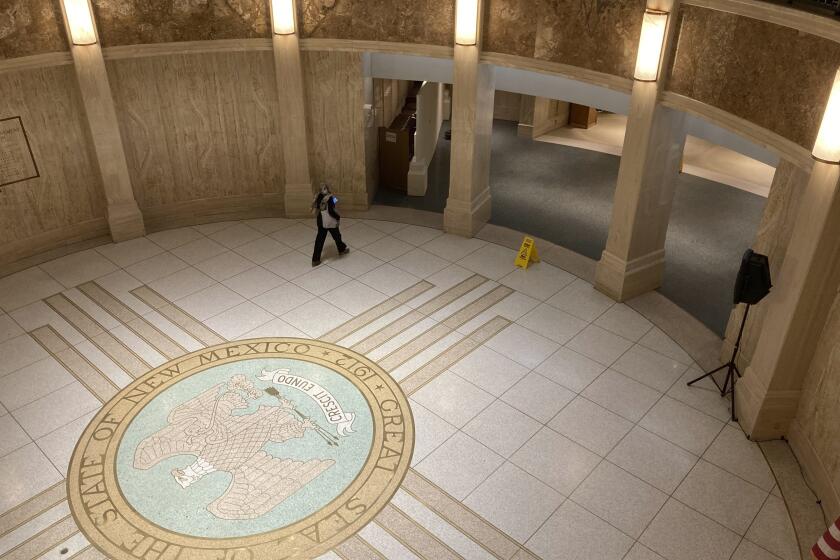Iraqi fishermen pull in a boatload of trouble along with their catch
Some days, fisherman Aoun Saleh loves life on the seas: the friendships, the jokes, the singing, especially when they have a big catch. But some days he rues the day he first walked onto the docks.
Like the time, he says, the Kuwaiti sailors stopped his boat in midwinter and forced the entire crew to swim in the cold waters. Or when the Iranian coast guard held him and other fishermen captive, forcing them to cook and clean for them. More recently, he said, Iranian sailors stopped his boat in Iraqi waters, stole the fish and threatened to take the Iraqis to Iran.
Saleh thinks the lack of respect is a sign of how far Iraq has fallen since Saddam Hussein was overthrown five years ago.
“They didn’t dare to do that during Saddam’s time,” he bristles. “Now we don’t know who can protect us -- the British? The Americans? The government? Or none of them?”
Indeed, at least eight Iraqi fishermen have been killed this year by gunfire from Kuwaiti or Iranian naval ships, according to statements from the Iraqi police and navy. The attacks have taken place, Iraqis say, in Iraqi waters and border areas as well as in their neighbors’ waters when fishermen mistakenly strayed in.
The fishermen press on with their work if only because they have to eke out a living in a woeful economy. Each day, they travel the tiny 37-mile coastline, a legacy of boundaries drawn in the early 20th century by Western nations as the Ottoman Empire collapsed.
One Iraqi fishery official, speaking on condition of anonymity, said the attacks were motivated by a desire for revenge over Iraq’s invasion of Kuwait in 1990 and its war with Iran during the 1980s. He said the neighbors are able to pressure Iraq at sea because they know the country remains weak.
The official did fault the fishermen for crossing into Iranian or Kuwaiti waters on occasion because Iraqi waters yield fewer and fewer fish. For its part, the Iranian Embassy in Baghdad denied that Iranian sailors had ever harassed Iraqi fishermen. Kuwait has rejected similar accusations.
Zuhair Badran, 36, began fishing when he was 19. Whereas he once felt he could make money in the trade, now he feels like a pauper. Before the U.S.-led invasion of Iraq in 2003, the state sold 18 barrels of diesel for $13. Now his crews never have enough fuel. Desperate, they buy diesel from Iranian fishermen at $150 per barrel.
Yet fuel prices are the least of Badran’s worries. He too complains about the Iranian and Kuwaiti coast guard crews who he says threaten Iraqi boats in neutral waters. A year ago, Badran says, he was briefly detained by the Kuwaitis.
“They arrested me for hours, confiscated everything on my dinghy and started to torture me for more than six hours, breaking my arm and two ribs,” Badran says.
He says that an Iranian sniper shot two fishermen to death this summer. “We were near the place where the fishermen used to gather after their return from fishing, and an Iranian sniper killed two of them,” Badran says.
Saleh, 38, visits the local employment center every day, hoping to find an alternative to fishing. He has found nothing.
“We have no other way to get our livelihood,” Saleh says. “Fishing is the only job people can find in this city. Believe me, if there are any other jobs, I would never look at the sea again!”
When he is fishing, in a boat crammed with 13 or 14 men on a small deck, Saleh spends long nights watching the nets and then hauling in the catch. Sometimes, the fish are sick and worthless.
His colleagues remember when a good haul could bring in $150. Now they are happy to finish a trip with $50 in their pockets.
Some of Saleh’s friends have joined the security forces, but he says he is too fat for the army or police. He’s tired of the cramped quarters and the way the eastern winds tear at his skin -- though at least when there is bad weather, he says, it keeps the Iranian and Kuwaiti coast guards away.
“That is better than nothing.” he says.
Yousif Yaqoub, 48, who owns seven fishing boats, has also thought about walking away. This summer, he says, the Kuwaitis detained him for several days and forced him to hand over up to $3,330 worth of fish. He finds the Iraqi government inattentive. He says the government doesn’t provide him cheap fuel and he grimaces about being asked to pay fees in order to fish. But like the others, he can’t bring himself to renounce his trade.
“We will continue this job not only because it is the only job in this city but because we love it,” he says. “We love the sea.”
--
Times staff writer Usama Redha and a special correspondent in Basra, Iraq, contributed to this report.
More to Read
Sign up for Essential California
The most important California stories and recommendations in your inbox every morning.
You may occasionally receive promotional content from the Los Angeles Times.










